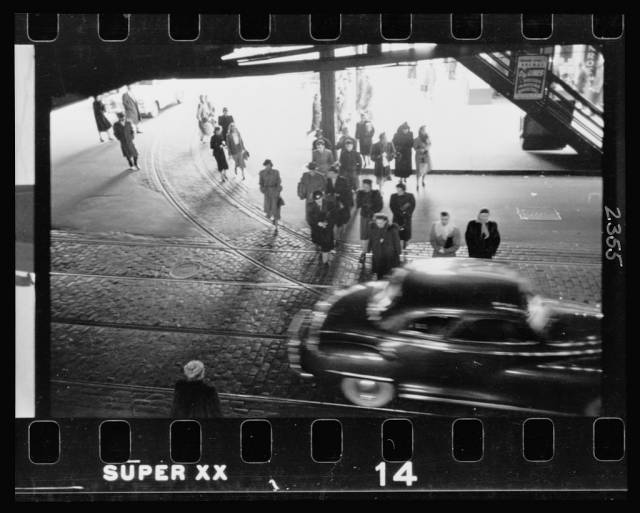Fridays With Roy: After Midnight At Chicago And Rush, A New Story By Barry Gifford
By Barry Gifford in Arts & Entertainment on Nov 6, 2015 4:45PM
These days there's a currency exchange at the corner of Chicago Avenue and Rush Street, and just around the corner on Rush is Pippin's Tavern. But once upon a time, that particular stretch just off Chicago's Magnificent Mile was a jumble of bars and nightclubs, with an all-night drugstore/liquor store plumped down in the middle of it all. That's where this week's story from Barry Gifford takes place. Like the others in this weekly series, it comes from a work in progress tentatively titled The Cuban Club. Tune in next week for another installment.
by Barry Gifford
“Then that greaseball actor shows up, and guess who’s with him?”
“What actor?”
“Guy with black, curly hair was in the picture where the giggling creep pushes the old lady in a wheelchair down the stairs.”
“The actor pushed the woman in the wheelchair?”
“No, the other one, the cop. He’s got the rich kid’s wife with him, the brunette the queer actor falls for so he drowns his pregnant girlfriend.”
“The same movie?”
“No, another one.”
“I don’t go to the pictures much. I get antsy. Half of the show I’m in the lobby smokin’, waitin’ on Yvette.”
“I Also Deal in Fury, you didn’t see it?”
“No.”
“Anyway, they don’t want nobody to know they’re in Vegas together, but after ten minutes it’s all over town.”
“What did they expect?”
“In for the weekend.”
“They want privacy they go to the springs, get a mud bath.”
Roy was sitting next to the men on a pile of unsold newspapers waiting for his father. It was three-thirty in the morning and his father had said he’d be back at the liquor store by three. Phil Priest and Eddie O’Day were keeping an eye on the boy.
“You okay, kid?” Eddie asked. “Your dad’ll be here soon.”
“Here,” said Phil. “Take it by the grip.”
Phil Priest pulled a snubnose .38 out from inside his coat and handed it to Roy.
“You ever handled a piece?”
“Phil, you nuts?” said Eddie. “His old man won’t like it, he finds out.”
“Be careful, kid,” Phil said, “Don’t touch the trigger.”
“Is it loaded?” Roy asked.
“You got always to assume a piece is loaded. And never point it at anyone other than you mean business.”
“It’s heavy,” said Roy. “Heavier than I thought.”
“How old are you, now, Roy?”
“Ten. How old are you?”
“Thirty-two.”
Roy’s father came in and saw Roy holding the gun. Phil took it from him and replaced it inside his coat.
“Roy,” said his father, “go stand outside for a minute. By the door, where I can see you.”
Roy slid off the stack of newspapers, walked out and stood by the entrance. He liked being up late and looking at people on the street. They were different than the people he saw during the day and in the evening who hung around his father’s place. Their faces were hidden even under the lights from the signs on the clubs and restaurants. Phil and Eddie came out of the store and walked away without saying anything.
“Dad, can I come back in now?”
Roy’s father came out and stood next to him and draped his right arm around Roy’s shoulders. He was wearing a white shirt with the long sleeves rolled up to his elbows and a blue tie with a gold clasp with his initials engraved on it.
“It’s cooler out here,” he said. “Chicago gets so hot in the summer.”
“Are you angry at Phil for showing me his gun?”
A girl came by and stopped and whispered into Roy’s father’s ear. Her high heels made her taller than his father. She walked around the corner onto Rush Street.
“What did she say, Dad?”
“Thank you.”
“For what?”
“I helped her out with something the other day.”
“What’s her name?”
“Anita.”
“She’s tall.”
“She’s a dancer at The Casbah.”
“Dad?”
“Yes, son?”
“Are you still angry at Mom?”
“No, Roy. I’m not angry at your mother.”
“What about Phil?”
